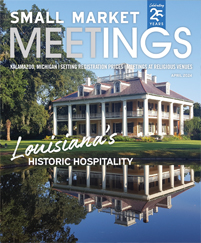When it comes to making hotel arrangements, meeting planners often fail to take advantage of the free housing services from convention and visitors bureaus. As one of the meeting industry’s best-kept secrets, these housing bureaus operate as direct liaisons to nearby businesses, providing clients with all the necessary resources to make their event a success.
“Nobody has a better relationship with the hotels than the city, because we work with them day in and day out,” said Karen Wallace, director of housing services at the Greater Louisville Convention and Visitors Bureau in Louisville, Kentucky.
A Personal Connection
In essence, housing bureaus offer a personal connection to all the hotels in a city, making it easy for planners to book room blocks at the best prices, as well as monitor room reservations.
Housing staff want events to succeed as much as they want to fill hotel rooms, so in many ways they act as liaisons for the planner, helping with site selection, promotional materials, press releases and more. This gives planners a central contact in the city and saves them the trouble of having to correspond with multiple hotels and businesses at once.
“The CVB is known as a one-stop shop for conventions, meetings and events, and housing bureaus are just an extension of that,” said Teri Schmidt, executive director at the Sioux Falls Convention and Visitors Bureau in Sioux Falls, South Dakota.
One of the first steps in the planning process is to find out which locations best serve a client’s needs. Once initial contact is made, bureaus work with planners to establish an accommodation bid, which involves setting a contract with the hotels.
“Let’s say you called me about doing an event,” Schmidt said. “I would take down all of your information — that you wanted to bring 200 people and you need one hotel, three luncheons, a banquet and a reception — I would put all this in a ‘sales flash’ and email it out to all our hotels.”
After the hotels respond with their availability and best prices, the bureau compiles this information for the client, who then signs a contract with their hotel of choice. For planners, exploring options has never been easier.
Real-Time Tracking
During the reservation process, housing bureaus use their resources to regulate the number and location of rooms selected.
“The real value of our service is that we help meeting planners closely monitor their room block commitments to ensure that they are meeting their contractual obligations,” said Amy Cabe, director of convention services at Visit Spokane in Spokane, Washington. “If we observe that one hotel’s room block is poised to sell out briskly while another hotel’s rooms are sitting untouched, we work quickly by advising the meeting planner of this and recommending adjustments.”
Likewise, many have an online housing program that allows planners to keep track of which guests have made reservations and what rooms still need to be filled. This is helpful with managing staff and VIP lists, since planners may know how many rooms are needed ahead of time but not where people will choose to stay.
As clients update their guest lists, bureau staff send out weekly reports on which rooms are currently full or available. According to Rachel Meagley, the convention services and research coordinator at Visit Spokane, planners can control their level of involvement with this process.
“They get a login, so they can go in and see their block or pull reports,” she said. Other planners choose not to visit the site at all and simply wait to receive reports from the bureau.











